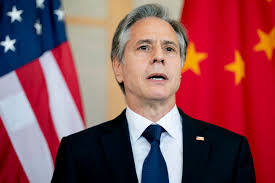US Secretary of State Antony Blinken arrived in Saudi Arabia Tuesday on a trip to strengthen strained ties with the long-time ally as the oil-rich kingdom forges closer relations with Washington’s rivals.
Blinken’s three-day visit will also focus on efforts to end conflicts in Sudan and Yemen, the joint battle against the Islamic State group (IS) and the Arab world’s relations with Israel.
His trip comes at a time of quickly shifting alliances in the Middle East, centred around a China-brokered rapprochement in March between regional heavyweights Saudi Arabia and Iran.
Another landmark change saw Syrian leader Bashar al-Assad invited back to the Arab League last month for the first time since the start of the 12-year civil war in which his government has been backed by Russia and Iran.
“There is just a tremendous amount of work that we’re trying to do,” a US State Department senior official dealing with Arabian Peninsula affairs, Daniel Benaim, said before Blinken’s trip.
“We’re focused on an affirmative agenda here and the great deal of work our countries can do together.”
Blinken landed in the Red Sea city of Jeddah Tuesday evening and is expected to meet Saudi Arabia’s de facto leader Crown Prince Mohammed bin Salman, according to a US official, before heading to Riyadh Wednesday for a Gulf Cooperation Council meeting.
– Energy prices –
The visit is Blinken’s first since the kingdom restored diplomatic ties with Iran, which the West considers a pariah over its contested nuclear activities and involvement in regional conflicts.
The United States offered cautious support for the deal that was sealed in China, the rising power making inroads in the Middle East.
US-Saudi relations, centred for decades on energy and defence, were badly strained by the 2018 murder of dissident journalist Jamal Khashoggi by Saudi agents.
Washington was also upset when Saudi Arabia, the world’s biggest oil exporter, refused to help bring down skyrocketing energy prices after Russia’s attack on Ukraine in February last year.
Rights activists including Abdullah Al-Qahtani, a US citizen whose father, Mohammad Al-Qahtani, was jailed for 10 years after founding a civil rights group in Saudi Arabia and who remains unaccounted for, urged Blinken to raise their concerns.
“He has to bring up my dad’s situation. Is he alive? Is he being tortured? We don’t know,” Abdullah Al-Qahtani told a virtual news conference.
Prince Mohammed, 37, has steered an independent foreign policy course, also hosting Venezuelan President Nicolas Maduro on Monday.
Iran, the arch-enemy of the United States and Israel for decades, reopened its embassy in Saudi Arabia on Tuesday following a seven-year hiatus.
Still, US-Saudi strategic relations remain close, especially on defence: Washington has long provided the Sunni Arab giant security protection from Shiite Iran, and Riyadh buys cutting-edge US weaponry.
– Israel relations –
US and Saudi diplomats have cooperated closely on efforts to broker a lasting ceasefire in Sudan’s eight-week-old war, so far unsuccessfully, and Saudi help was crucial in evacuating thousands of foreigners from the war zone.
The two allies are also engaged in the ongoing battle against IS, the jihadist group that has lost all its territory in the Middle East but is increasingly active in parts of Africa.
They are also discussing efforts to end the conflict in Yemen, where a Saudi-led coalition has long provided military support to the government in a fight against Huthi rebels backed by Iran.
The United States also hopes that Saudi Arabia will eventually agree to normalise relations with Israel, which has already built ties with several other Arab countries under the Abraham Accords brokered by the Donald Trump administration.
On the eve of his Saudi trip, Blinken reiterated that “the United States has a real national security interest in promoting normalisation between Israel and Saudi Arabia”.
He said Washington has “no illusions” that this can be done quickly or easily, but stressed that “we remain committed to working toward that outcome”.
Saudi Arabia has so far maintained that Israel must first recognise an independent Palestinian state.















































